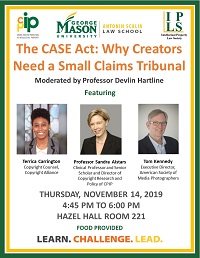Greetings from CPIP Executive Director Sean O’Connor

CPIP started a busy and productive October with our Seventh Annual Fall Conference, The IP Bridge: Connecting the Lab & Studio to the Market, which featured—among many informative and well-received panels and presentations—keynote addresses by Professor Robert Merges of UC Berkeley and Maria Pallante of AAP. The video of Professor Merges’ keynote is available here, and the rest of the videos will be posted on the conference website soon. Thank you to all who attended and took part!
In mid-October, CPIP held the second meeting of our copyright research symposium, Safe Harbors and Private Ordering in the Creative Industries, at Antonin Scalia Law School. Several scholars presented drafts of their papers and received feedback from the rest of the participants. In other October news, former CPIP Research Assistant and recent Scalia Law graduate Cassandra Sciortino has been named a Barbara A. Ringer Fellow at the U.S. Copyright Office. We congratulate her on the appointment and wish her success in her new role and beyond.
This has also been a great month for CPIP engagement in events and scholarship, and we are proud of all those whose work is featured below. My own October included a presentation at the Fifth Annual IP Mosaic Conference at Howard Law School in conjunction with the Institute for Intellectual Property & Social Justice (IIPSJ), as well as a co-presentation with CPIP Deputy Director Kevin Madigan for members of the Japan Intellectual Property Organization (JIPA), during which we spoke on Scalia Law’s history, IP, and CPIP’s work. I also participated as a lecturer, moderator, and panelist at the Law and Economics Center’s recent symposium in Denver, Colorado.
We’re looking forward to a November of planning and engagement that will give CPIP a strong start in 2020. In the meantime, best wishes for the rest of your fall and the upcoming Thanksgiving holiday!
Join Us for a Panel Presentation on the CASE Act on November 14

On Thursday, November 14, CPIP and the Intellectual Property Law Society (IPLS) will co-host a panel presentation entitled The CASE Act: Why Creators Need a Small Claims Tribunal at Scalia Law. The panel includes CPIP Director of Copyright Research and Policy Sandra Aistars, Terrica Carrington of the Copyright Alliance, and Tom Kennedy of American Society of Media Photographers (ASMP), and it will be moderated by CPIP Director of Communications Devlin Hartline.
The Copyright Alternative Small-Claims Enforcement Act (CASE Act) would create a tribunal within the U.S. Copyright Office to hear small copyright claims. This panel features three leading experts who have each played an important role in advocating for the CASE Act. They will discuss the substance and history of the CASE Act, its prospect for being passed by the Senate, and what it means for individuals and small businesses who have welcomed the meaningful copyright protection that the bill would provide.
Spotlight on Scholarship

Daryl Lim, Judging Equivalents (forthcoming)
In this forthcoming paper from our Thomas Edison Innovation Fellowship, Daryl Lim of John Marshall Law School looks at the doctrine of equivalents, which gives patentees protection beyond the literal words of their claims. Professor Lim surveys the law and literature over the past 150 years and provides empirical data that helps to clarify the doctrine’s nature and contextualize its evolution and future.
Jonathan Ashtor, Modeling Patent Clarity (forthcoming)
In this forthcoming paper supported by a CPIP Leonardo da Vinci Fellowship Research Grant, Jonathan Ashtor of Cardozo Law employs sophisticated machine learning techniques to model patent clarity and provide unprecedented empirical analyses of the relationships between patent clarity and the public and private value of patent rights. The results empirically demonstrate the importance of patent clarity to the social and private functions of patents.
Runhua Wang, New Private Law? Intellectual Property ‘Common-Law Precedents’ in China (forthcoming)
In this forthcoming paper from our Thomas Edison Innovation Fellowship, Runhua Wang of Chicago-Kent College of Law surveys twenty-two guiding cases that act as binding precedent in IP cases in China and compares them with corresponding judicial precedents in the United States. Dr. Wang argues that these guiding cases are not conventional private or public law, and she explains how they take a utilitarian and pragmatic approach to statutory interpretation.
Activities, News, & Events

CPIP Senior Scholar Kristen Osenga has been appointed the Austin E. Owen Research Scholar at the University of Richmond School of Law. Professor Osenga joined the faculty in Richmond in 2006, where her recent scholarship focuses on patent eligible subject matter, patent licensing firms, standard setting organizations, patent law reform, and claim construction, and she has written numerous law review articles on these and other topics. The CPIP team sends Professor Osenga its warmest congratulations on a well-deserved appointment!
The recent drug patent research paper written by CPIP Director of Life Sciences Erika Lietzan and Professor Kristina Acri of Colorado College has been positively received this past month. The paper, Distorted Drug Patents, will be published in the Washington Law Review, and it has been featured by Politico, Bloomberg Law, Patently-O, and FDA Law Blog as a valuable contribution to the empirical research on whether the patent system provides adequate incentives for innovation in the pharmaceutical industry.
CPIP Director of Copyright Research and Policy Sandra Aistars and CPIP Director of Communications Devlin Hartline lectured to a group of visiting IP professionals from the Zhejiang Provincial Administration for Market Regulation in China at George Mason University’s Schar School of Policy and Government. Professor Aistars discussed private ordering in copyright enforcement, while Professor Hartline talked about protecting brands in a modern economy.